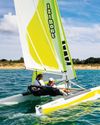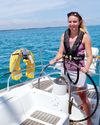
Recently I welcomed a classic motorboat into my small fleet of good old boats. The small wooden cruiser, built over 55 years ago, is in dire need of restoration, though the carvel planked hull is in surprisingly good shape. However, much of the boat's superstructure-including the wheelhouse and main cabin - was cracked and rotten, and the bilges full of rainwater.
My first job was to find a quick way to install at least one automatic bilge pump so I wouldn't need to rush to the boat after each rainfall. I did what I could to temporarily reduce water ingress. However, the boat was far from watertight, especially after the heavy rain storms we've experienced in recent years.
The installation had to be foolproof but not permanent, as I'd be working on the boat and the bilge pumps would also need to be easily removable.
I decided to use two bilge pumps-one automatic and one with manual control.
Each of the pumps I used have a removable base (the basket/strainer) with predrilled holes to secure the pump in a boat bilge.
The main body of the pump, which contains the motor with impeller and electrical gear, is secured to the base with plastic clips. This is a fine solution when you need to separate the pump from the base occasionally, for example to clean the basket, but I doubted it would withstand repeated removal and mounting over the next few months, and possibly years of renovation work.
I needed a solution that would enable me to remove the pumps without separating them from their bases/ strainers. Removal or repositioning should be simple and not prevent installation on the very bottom of the bilges.
After some thinking, I decided to fabricate two stainless steel brackets made from thin sheet metal. I would mount each pump using existing mounting holes on the base and when installed this way, the pump would still sit almost on the bottom of the bilge.
Diese Geschichte stammt aus der Summer 2023-Ausgabe von Practical Boat Owner.
Starten Sie Ihre 7-tägige kostenlose Testversion von Magzter GOLD, um auf Tausende kuratierte Premium-Storys sowie über 8.000 Zeitschriften und Zeitungen zuzugreifen.
Bereits Abonnent ? Anmelden
Diese Geschichte stammt aus der Summer 2023-Ausgabe von Practical Boat Owner.
Starten Sie Ihre 7-tägige kostenlose Testversion von Magzter GOLD, um auf Tausende kuratierte Premium-Storys sowie über 8.000 Zeitschriften und Zeitungen zuzugreifen.
Bereits Abonnent? Anmelden

Orca sink yacht in Strait of Gibraltar
Spain's maritime rescue service, Salvamento Maritimo, has reported that a 15m (49ft) yacht sank in Moroccan waters in the Strait of Gibraltar following interaction with a pod of orca.

No kill cord or lifejackets were worn during fatal powerboat crash
A kill cord and lifejacket are useless unless worn-that's the warning from the Marine Accident Investigation Branch (MAIB), following its investigation into a powerboat crash that killed a 32-year-old woman and five-year-old girl on 2 October 2022.

Multihull sail work
Brush up on multihull sailing skills before heading off on charter with Gavin Le Sueur's guide to spinnaker handling, tacking and gybing

Five top causes of engine failure and how to prevent them
Jake Kavanagh talks to Sea Start marine engineer Nick Eales about how to avoid the five major causes of an engine breakdown at sea

Sail the Atlantic with strangers
Would you sail across the Atlantic with someone you've just met? Ali Wood meets the cruising crews who've done just that

IZIBoat: simple sailing
Rupert Holmes sails an innovative catamaran design intended to widen participation in sailing among those with little time to get on the water in more conventional craft

30 WAYS TO GET AFLOAT
From tall ships to small dinghies, you needn't own a boat to sail. Ali Wood looks at the options, and how skippers can also find crew

Boats for restoring under £20,000
Duncan Kent picks the best sub-35ft sail and power boats to look for when aiming to undertake a restoration on a budget

Seaworthy dinghies for less than £500
For low cost traditionally-styled GRP trailer-sailers, consider the Foreland and the Otter available at bargain basement prices

Playing with coloured sails
Maintaining an hourglass-shaped balloon and ratcheting up the log numbers